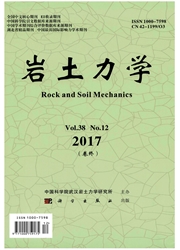

 中文摘要:
中文摘要:
抗拉强度是黏性土重要的力学指标之一。自行研制了简易土工拉伸仪,并通过试验确定了合适的制样方法。在此基础上,对具有胀缩性的武鸣红黏土和百色膨胀土分别进行试验,探讨了其抗拉强度与干密度、含水率、干湿循环次数等影响因素的关系,研究结果表明:两种土的抗拉强度-含水率曲线在饱和度接近66%时出现峰值,该峰值对应含水率接近最优含水率,峰值两侧呈指数关系变化,抗拉强度随含水率的变化规律受土中水的形态影响。抗拉强度随干密度的增加而线性递增,增加幅度显著。抗拉强度随干、湿循环次数增加而衰减,1~2次循环时,强度衰减幅度最大,但3次循环后,趋向于一稳定值,稳定值为初始值的20%左右,土体干、湿循环后抗拉强度降低是微结构劣化的结果。
 英文摘要:
英文摘要:
Tensile strength is an important mechanical index of clay. A set of tensile strength apparatus is developed to test the tensile strength of clay and the specimen-preparing methods on tensile strength are studied. Tensile strength tests for two types of swell-shrink soils are respectively designed to discuss the influences of water content, dry density and drying-wetting cycles. Analysis of the data shows that there is an exponential relationship between tensile strength and water content; and the tensile strength reaches the peak value at optimum water content, saturation degree of 66%. And the change rule of tensile strength with water content is impacted by the forms of water in soils. It is also found that tensile strength linearly increases with dry density and the increase rate is significant. As experienced three dry-wetting cycles, the tensile strength sharply decreases to 20% of the initial value and its impact is especially obvious during the first and second cycles. Through theoretic and contrast analysis, it is found that the decrease of tensile strength of swell-shrink soils with drying-wetting cycles is due to the deterioration of microstructures.
 同期刊论文项目
同期刊论文项目
 同项目期刊论文
同项目期刊论文
 期刊信息
期刊信息
